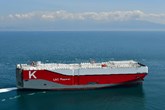Flag state’s role in decarbonising the shipping industry
Published by Leah Jones,
Digital Administrator
LNG Industry,
A major challenge facing shipowners today is: how are we going to meet the new MARPOL Annex VI requirements? This debate around maritime decarbonisation will shape the course of the industry for decades to come. The maritime industry has to decide now how to best address these upcoming regulations; whether they implement new technologies, switch to new fuel sources, and/ or change their existing operational methods. Many ship owners have serious concerns regarding this, but some see this as an opportunity to transform the maritime industry along the lines of environmental sustainability, paving the way for a future with emission-free international shipping.
The Liberian Registry has taken a leading role, from the flag state perspective, to work in close collaboration with high-quality shipowners/operators, engine manufactures, shipyards, and designers, as well as classification societies and other key stakeholders toward a zero-emission sustainable future. Yet doing so along the lines of a common-sense approach, and with a level playing field. Liberia has proactively built a world-renowned Global Gas Team, which has made the Registry the go-to flag for shipowners. This is evidenced not only in the continuous fleet growth of the Registry, but also by the fact that Liberia has the most dual-fuelled, deep-draft vessels in the world and the fastest growing gas carrier fleet in the world.

The MOUNT TOURMALINE, the first LNG-fuelled Newcastlemax bulk carrier, owned by Eastern Pacific Shipping and Liberian flagged.
At the Marine Environment Protection Committee meeting (MEPC 76) in June 2021, the IMO adopted new requirements for Energy Efficiency Existing Ships (EEXI), Carbon Intensity Indicator (CII) and Enhanced Ship Energy Efficiency Management Plan (SEEMP) Part III effective from 1 January 2023. The EEXI requirement is a technical measure for existing ships similar to the EEDI requirements for new-builds that have been in force since 2013, whereas the new CII requirement is an operational measure that will get stricter and stricter each year from 2023 to 2030 to ensure international shipping follow the decarbonisation strategy that was adopted by IMO in 2018.
Latest developments from the IMO include the consideration of the complete GHG footprint of marine fuels in the regulatory framework through a well-to-wake lifecycle assessment approach. The draft Guidelines for Lifecycle GHG and Carbon Intensity for Maritime Fuels (LCA Guidelines) have been prepared and should be finalised as soon as possible.
Vessel owners and operators now have to decide on how they are going to meet these requirements. For existing vessels, are they going to do retrofits, use energy efficiency devices, or engine power limitation/shaft power limitation (EPL/ShaPoLi)? On new-builds are they going to use alternative fuels such as: LNG, hydrogen, ammonia, bio fuels, and/or methanol? The Liberian Registry is actively involved in supporting the industry through its involvement in joint industry projects with focuses on innovative ship designs with new technologies and alternative fuels. In these projects the Registry works in close collaboration with shipyards, designers, classification societies, shipowners, and other key stakeholders applying the provisions in the regulatory framework that allows for alternative and innovative designs to be approved, often through a comprehensive risk assessment approach leading to an approval in principle being granted.

The Registry’s Global Gas Team has been specifically tasked with supporting their gas fleet from the design phase through construction and delivery, and then while in operation. This team is in place to assist in the review of future vessel designs, offering insights and recommendations to mitigate risks/costs, technical and safety implications, and demonstrate compliance with applicable rules and regulations. In addition to having an experienced global team of professionals in this space, the Liberian Registry has achieved Qualship-21 status with the US Coast Guard and is White Listed on the major Port State Control MOU’s, and currently comprises a fleet of over 5000 vessels totalling 210 million gross tonnes.
While the industry is trying to determine how to best meet these new requirements, the Liberian Registry is positioning itself to provide owners and operators with a capable and experienced team to assist in this process from the regulatory stand point. Liberia is partnering with ship owners and operators on the smooth implementation and compliance with these new regulations in a practical way, across a spectrum of technologies and options. The Liberian Registry’s Global Gas Team is working around the clock to ensure owners and operators have a viable solution. Any questions, concerns, or need for further information can be obtained from the Registry directly from IMO@liscr.com and houston@liscr.com.
By Thomas Klenum, Executive Vice President, Innovation & Regulatory Affairs and Dallas Smith, Vice President LNG & Alternative Fuels – Liberian Registry
Read the article online at: https://www.lngindustry.com/special-reports/26042022/flag-states-role-in-decarbonising-the-shipping-industry/
You might also like
‘K’ Line receives LNG-fuelled car carrier
An LNG-fuelled car carrier with a capacity of 6900 vehicles has been delivered to Kawasaki Kisen Kaisha, Ltd.


